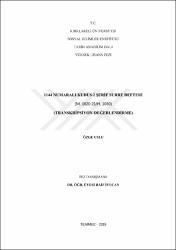| dc.contributor.author | Uslu, Özge | |
| dc.date | 2019-12 | |
| dc.date.accessioned | 2020-02-06T07:17:58Z | |
| dc.date.available | 2020-02-06T07:17:58Z | |
| dc.date.issued | 2019 | |
| dc.identifier.citation | Uslu, Ö. (2019). 1144 Numaralı Kudüs-i şerif Surre Defteri (M. 1620-21/h. 1030) (Transkripsiyon-Değerlendirme), Kırklareli Üniversitesi Sosyal Bilimler Enstitüsü, Kırklareli | |
| dc.identifier.uri | https://hdl.handle.net/20.500.11857/1249 | |
| dc.description.abstract | Surre, kelime olarak kese, akçe kesesi, para kesesi demektir. Genel olarak içine değerli eşya ve para konan şeylere de surre denmektedir. Terim olarak ise; Osmanlı Devleti tarafından her yıl Hac mevsiminde Haremeyn-i Şerîfeyn (Mekke ve Medine şehirleri) ve Kudüs-i Şerîf ahalisine gönderilen aynî ve nakdî yardımlara denmektedir. Gönderilen paralar, keselere koyulduğu için bu adı almıştır. Bir diğer adı da 'malûmiyye' idi. Osmanlılarda sürrenin başlangıcı eskilere dayanmaktadır. Kaynaklarımızın belirttiği üzere surre alayını gönderen ilk Osmanlı Hükümdarı Yıldırım Bayezid Handır. İlk surreyi Yıldırım Bayezid, sonra oğlu Çelebi Sultan Mehmed göndermişlerdir. Sultan II. Murad da Mekke, Medine ve Kudüs'e her yıl surre gönderirdi. Surre kafilesi, her yıl Receb-i Şerîf'in on ikisinde muhteşem bir alayla İstanbul'dan yolcu edilirdi. Osmanlılar'ın Kudüs'e hizmetleri yönetimleri boyunca artarak devam etmiştir. Osmanlılar'ın verdikleri isimle Kudüs-i Şerîf, üç semavi din tarafından mukaddes kabul edilen yegâne şehirdir. Mekke ve Medine'nin yanısıra Kudüs'e ve Halîlü'r-rahman'a da surre gönderilmiştir. Kudüs sürresi ise, kaynaklara göre Sultan II. Murad döneminde gönderilmeye başlanmıştır. Osmanlı hükümdarları, surrenin güvenli bir şekilde Kudüs'e ulaştırılmasına ve ihtiyaç sahiplerine dağıtılmasına özen göstermişler. Hac yolları üzerinde bulunan Kudüs ve çevresinde emniyet ve asayişin sağlanması son derece mühim bir konu olarak değerlendirilmiştir. Bu hususta, H. 1030 / M. 1620-1621 tarihli Kudüs Ahâlîsi Surre Defteri'nden, Osmanlı Kudüs'ünün 17. yüzyılın ilk çeyreğindeki tarihini, sosyokültürel ve iktisadî durumunu içeren kıymetli bilgiler elde edilmiştir. Tezimizi müteşekkil defterimizi transkript edeceğiz ve surre defterimizin ayrıntılı olarak değerlendirmesini yapacağız. Böylelikle Osmanlı devleti döneminde Kudüs'ün çalışmamız için belirlediğimiz tarihler süresince nasıl bir yol izlediğini aktarmış olacağız. | |
| dc.description.abstract | The word surre actually means sac or coin purse. In a broader sense, surre is used for any type of case for placing valuable objects or money. As a historical term surre means the benevolent contributions – in cash or in kind– sent to the residents of Haremeyn-i Sherifeyn (Mecca and Medina) and Quds al-Shareef (Jerusalem) by the Ottoman State every year during the hajj season. The package was named after the sacs, the money were placed in. Another name coined for this package was "malumiyye". Surre in the Ottoman, the beginning of surre tradition in the Ottoman Empire roots back to Sultan Bayezid the Thunderbolt, who was the first sultan to send surre. After him the tradition was continued by his son Sultan Tchelebi Mehmed. According to our sources, the first Ottoman State to have sent a surre procession is Sultan Bayezid the Thunderbolt. Turkish Sultans began to send caravans carrying presents to the Hijaz starting with Çelebi Sultan Mehmed. Again, Sultan Murad II., also sent surres to Mecca-Medina and Jerusalem each year. Every year, the surre procession was sent with a dashing Ceremony on 12 Rajab. The services of Ottomans to Al-Quds have continued with a substantial increase durind their reign. Al-Quds Al-Shareef as the Ottomans used to call, is the only city with three Holy boks. The issue of proving security and public order on the ways around Al-Quds which are placed on the route to Hajj was evaluated as a very important issue. Ottoman Sultans attentive to delivery and distribution of surre to the needy people in Jerusalem. In this connection, dated 1620-1621 Jerusalem the inhabitants from surre register, history of Ottoman Jerusalem's at the first half of 17th century, obtained sociocultural and economical including situation valuable knowledges. Thesis composed register transcript practise and surre register as thorough doing evaluate. In this way, Jerusalem's during the Ottoman State in period for study during dates specify convey how to follow a course. | |
| dc.language.iso | tur | |
| dc.publisher | Kırklareli Üniversitesi Sosyal Bilimler Enstitüsü | |
| dc.rights | info:eu-repo/semantics/openAccess | |
| dc.rights.uri | http://creativecommons.org/licenses/by-nc-nd/3.0/us/ | * |
| dc.subject | Kudüs-i Şerîf | |
| dc.subject | Beytülmakdis | |
| dc.subject | Surre-i Hümâyûn | |
| dc.subject | II. Osman | |
| dc.subject | Surre Alayı | |
| dc.subject | Surre Defteri | |
| dc.subject | The Quds al-Shareef | |
| dc.subject | Islamicjerusalem | |
| dc.subject | History of Jerusalem | |
| dc.subject | Imperial Surre | |
| dc.subject | Sultan Second Osman | |
| dc.subject | Surre Ceremony | |
| dc.subject | Surre Register | |
| dc.title | 1144 Numaralı Kudüs-i Şerif Surre Defteri (M. 1620-21/h. 1030) (Transkripsiyon-Değerlendirme) | |
| dc.title.alternative | 1144 Numbered al-Quds al-Shareef Surre Register (A.d. 1620-21/Hijri. 1030) (Transcription - Assessment) | |
| dc.type | masterThesis | |
| dc.department | [KLÜ] | |
| dc.relation.publicationcategory | Tez | |





















